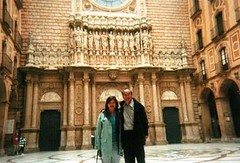"If my people who are called by my name, will humble themselves and pray and seek my face and turn from their wicked ways, then I will hear from heaven, and I will forgive their sins and will heal their land." 2 Chronicles 7:14
In the heyday of the evangelistic crusades, scores of people answered the altar call to find salvation in Jesus. Despite the emotional outpouring and the prayers to receive Christ, many did not receive salvation. The Bible said that they are like seeds that when sown never took roots and did not bear fruits. Their encounters with Jesus were short-lived and no true conversions took place.
One would assume as these people stepped forward they would regret their sinful nature. They would make a U-turn and return to God and find in Jesus, forgiveness of sin and strength to live a new life. That would be true repentance or t'shuva in Hebrew and it means more than to regret or to feel sorry; it means to turn back. Unfortunately many were led by emotional responses instead of truly repudiating their past lives and sins and then, coming by faith to accept Jesus Christ as their saviour.
J I Packer in his book, Rediscovering Holiness (Ref 1) argued that Christians are called to a life of habitual repentance. Packer pointed out that the very first of Luther's ninety-five thesis, nailed to the Wittenberg church door in 1517, declared: "When our Lord and Master Jesus Christ said, "Repent" He willed that the whole life of believers should be one of repentance".
What is repentance? J I Packer outlined that repentance means:
Repentance is not easy. Its effects must be deep, changing our characters, behaviours and lives. John Wesley said that God has forgiven all on the cross, but not all have repented. After we have repented and found the forgiveness of God, like son and father we are reconciled. This is the same place we should all want to be in; our relationship with God being fully restored. Henri Nouwen wrote in the "Return of the Prodigal Son", (ref 2) "The father's embrace of his son told me that I was desperately searching for the that inner place where I too could be held as safely".
One would assume as these people stepped forward they would regret their sinful nature. They would make a U-turn and return to God and find in Jesus, forgiveness of sin and strength to live a new life. That would be true repentance or t'shuva in Hebrew and it means more than to regret or to feel sorry; it means to turn back. Unfortunately many were led by emotional responses instead of truly repudiating their past lives and sins and then, coming by faith to accept Jesus Christ as their saviour.
J I Packer in his book, Rediscovering Holiness (Ref 1) argued that Christians are called to a life of habitual repentance. Packer pointed out that the very first of Luther's ninety-five thesis, nailed to the Wittenberg church door in 1517, declared: "When our Lord and Master Jesus Christ said, "Repent" He willed that the whole life of believers should be one of repentance".
What is repentance? J I Packer outlined that repentance means:
- Realistic recognition that one has disobeyed and failed God, doing wrong instead of doing right
- Regretful remorse at the dishonour one has done to the God one is learning to love and wanting to serve
- Reverent requesting of God' pardon, cleansing of conscience, and help to not lapse in the same way again
- Resolute renunciation of the sins in question, with deliberate thought as to how to keep clear of them and live right for the future
- Requisite restitution to any who have suffered material loss through one's wrongdoing.
Repentance is not easy. Its effects must be deep, changing our characters, behaviours and lives. John Wesley said that God has forgiven all on the cross, but not all have repented. After we have repented and found the forgiveness of God, like son and father we are reconciled. This is the same place we should all want to be in; our relationship with God being fully restored. Henri Nouwen wrote in the "Return of the Prodigal Son", (ref 2) "The father's embrace of his son told me that I was desperately searching for the that inner place where I too could be held as safely".
Lionel
Ref 1: J I Packer, "Rediscovering Holiness - Know the Fullness of Life with God". Regal
Ref 2: Henri Nouwen, "The Return of the Prodigal Son - A story of Homecoming." Image books Doubleday


.jpg)


